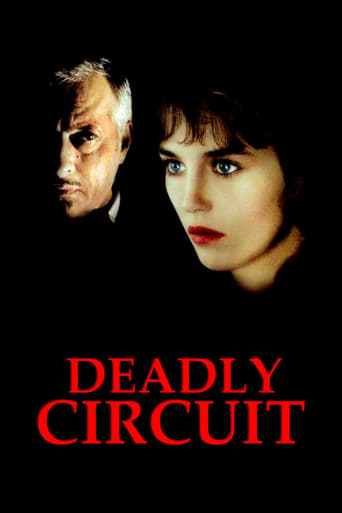GUENOT PHILIPPE
I watched EYE OF THE BEHOLDER a couple of weeks ago. It was the remake of this film, itself adapted from Marc Behm's novel. Both were. Each of these two movies is pretty good, but very different in the way of filming and also story telling. I would say this one is closer to the book, at least about the pear eater female character played by Isabelle Adjani. As far as I remember, it is not spoken about in the 1999 film. I also appreciate the Geneviève Page's performance as the Michel Serrault's boss, she reminds me Paul Meurisse in her way of talking, at least in her first sequence. Pretty amusing. This is the best French crime mystery movie from the eighties. a sad and poor decade for the French movie industry.
writers_reign
There is, alas, only one Prevert and if only Audiard realized and accepted that he may have abandoned his attempts to eclipse Prevert as a master of word-play and been content to try and equal him though even that was never going to happen. Claude Miller is definitely quirky and probably wouldn't know how to go about shooting an 'ordinary' film and as a result he either misses by a mile or hits one out of the park. This is one of his most surreal efforts but also one of his best but it helps if you are prepared to accept wackiness as Art form. A private investigator, Serrault, barely going through the motions of living since he allowed a personal tragedy - his wife walked out on him taking the daughter he never really knew and the daughter subsequently died aged seven - to color everything that came after, is assigned a fairly routine case to discredit what is assumed to be the gold-digging fiancé of a wealthy young man; instead he finds she is a serial killer and allows himself to fantasise that she is his lost daughter miraculously restored to life and is happy to watch passively as she moves from country to country leaving a string of dead man - plus one lesbian lover - in her wake; he is also not above covering her tracks. In terms of realism it makes Lord Of The Rings look like a documentary but it is also compelling. If you like this sort of thing this is the sort of thing you'll like.
Bob Taylor
The French love for American crime novels has been written about many times. Jim Thompson's works have been adapted by many of the leading directors. Truffaut's early career was based largely on this genre; he made Shoot the Pianist from David Goodis's novel, and many of Chabrol's films are taken from American pulp. Claude Miller made his second film Dites-lui que je l'aime from Patricia Highsmith's This Sweet Sickness.In Mortelle Randonnee, Miller is working with Marc Behm's novel The Eye of the Beholder, which I haven't read. I suppose Miller chose to throw out most of the plot elements of Behm's book; that's the usual practice in France. The theme of obsessional love of a man for the girl he believes to be his daughter is triumphantly brought to life by a great cast, aided by Carla Bley's richly melancholic music (post-modern brass band?), Pierre Lhomme's lovely camera-work (those rain-slicked night shots, the sad neon lights on hotel fronts), the expert choice of sets (Helmut Newton would have loved that German health spa where Catherine meets the lesbian Cora).Finally, the wonderful cast: Michel Serrault so wistful as the private investigator preparing an endless series of cover-ups of Adjani's killings, he's as good here as he was in Garde à vue; Isabelle Adjani living on her jangled nerves as she criss-crosses Europe in search of new prey; Geneviève Page (who I remember from Belle de jour--the brothel keeper) as the crisp director of the detective agency Serrault works for; the startling transformation of the gorgeous Stéphane Audran into a homely housewife--what a makeup job--who is also tracking Adjani. The last act is darker and more anguished than the preceding ones, the viewer will have to resist the urge to ask what happened to the comic bits.
Kurt Thomas
One of the best movies ever. Very dark, very deadpan, perfect acting. Great script, too.The La Paloma version in the blind man's villa is by Hans Albers.



